Enlisting The Sun: Optimizing Portable Solar Energy
Project Description
Forward Operating Bases are dependent on fuel to provide operational energy. Sustaining fuel levels is expensive and often dangerous, as convoys are vulnerable to attack during resupply missions. These missions account for the largest number of fatalities that occur on the battlefield. To reduce these attacks, introduction of a reliable energy source at Forward Operating Bases will decrease resupply missions.
In order to provide a reliable energy source, a portable photovoltaic unit was designed. The unit is constructed with readily available parts, for cost-effectiveness and easy repair. Collapsible features allow for compact packaging and shipment, maximizing deployment capability. A single unit is composed of four preassembled panels providing a simple set-up, increasing time efficiency. Units can be wired together in rows to maximize space and produce higher energy output. Micro-inverters and implementation to a grid-tied system provides greater reliability.
Modeling of a single unit with the National Renewable Energy Laboratory’s “PVWatts Calculator” resulted in varied energy production due to differences in geographic location and weather. For instance, results in December from Sembawang, Singapore indicates a production of 69 kWh, while production in Djibouti, Africa resulted in 30% more energy at 98 kWh. Maximum energy output was produced when panels were fixed at a 20 ° angle, for all locations annually.
Introduction of a portable photovoltaic unit supplies sufficient energy to decrease load on pre-existing fuel generators, thus decreasing overall fuel use. Renewable solar energy sources provide a reliable and sustainable future for Forward Operating Bases.















